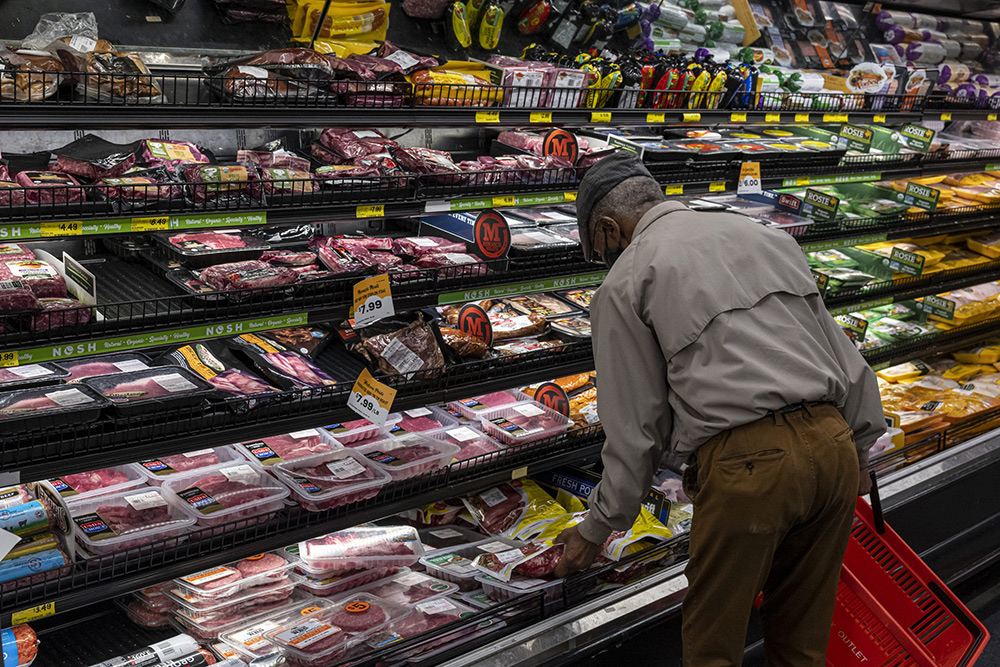
今年10月,美國(guó)的通貨膨脹率達(dá)到6.2%,,創(chuàng)下30年來(lái)新高,。如果美聯(lián)儲(chǔ)(Federal Reserve)和喬·拜登政府不改變目前的做法,那么通脹水平將對(duì)社會(huì)最弱勢(shì)群體(窮人,、婦女和其他少數(shù)群體)產(chǎn)生最嚴(yán)重的影響,。
當(dāng)局有理由擔(dān)心新冠疫情會(huì)導(dǎo)致重大的經(jīng)濟(jì)萎縮——這也是美聯(lián)儲(chǔ)和美國(guó)政府采取了旨在刺激經(jīng)濟(jì)的貨幣政策和財(cái)政政策的原因。直到最近,,人們?cè)趽?dān)心的還不是物價(jià)會(huì)上漲,,而是物價(jià)會(huì)像日本的通貨緊縮那樣跌得太多。價(jià)格跳水令人擔(dān)憂,,因?yàn)樗鼈儠?huì)導(dǎo)致消費(fèi)減少——消費(fèi)者在等待未來(lái)更好的價(jià)格,。
出于這種慣性,以及擔(dān)心過(guò)早打斷經(jīng)濟(jì)復(fù)蘇的勢(shì)頭,,美聯(lián)儲(chǔ)對(duì)通脹上升的擔(dān)憂未予理會(huì),反而表示,,通脹只是暫時(shí)性的,。這與人們的一致認(rèn)同——通貨膨脹有好處——不謀而合。正如貝萊德(BlackRock)的一位前董事總經(jīng)理所言:“許多美國(guó)人,,尤其是那些不那么富有的人,,實(shí)際上會(huì)從較高的通脹水平中獲益?!比藗兊闹庇X(jué)是,,在新冠疫情期間,,工資穩(wěn)步上漲,通脹侵蝕了家庭債務(wù)的價(jià)值,,提高了領(lǐng)薪工人的購(gòu)買力,,減輕了他們的債務(wù)負(fù)擔(dān),。
在過(guò)去的三十年里,,每年的通貨膨脹率一致低于5%,美國(guó)總?cè)丝谥屑s有一半人沒(méi)有經(jīng)歷過(guò)高通貨膨脹,,年齡中位數(shù)為38歲,。沒(méi)有經(jīng)歷過(guò)通貨膨脹的人,很難具體地把握其后果,。贊美通貨膨脹的人,,在一開(kāi)始可能會(huì)和關(guān)注貧困和不平等的人產(chǎn)生共鳴,但現(xiàn)實(shí)卻往往更加復(fù)雜,。
通貨膨脹率高漲,,會(huì)導(dǎo)致三個(gè)重要問(wèn)題。
首先,,通脹會(huì)對(duì)分配產(chǎn)生重要影響,,對(duì)最不富裕階層的傷害比對(duì)富人的傷害更大。雖然通貨膨脹侵蝕了每個(gè)人的購(gòu)買力,,但富人往往擁有能夠更好地抵御通貨膨脹的資產(chǎn),。例如,房地產(chǎn)資產(chǎn)的價(jià)格往往會(huì)隨著社會(huì)總體價(jià)格的上漲而升值,,租金收入也進(jìn)行調(diào)整,,以跟上生活成本的上漲,這可以為房產(chǎn)所有者提供一些保護(hù),,從而抵御通貨膨脹,。富人也往往有機(jī)會(huì)獲得對(duì)沖通貨膨脹的機(jī)制,比如將資產(chǎn)轉(zhuǎn)移到國(guó)外,、交易貨幣,,以及購(gòu)買黃金和加密貨幣。
相反,,工人階級(jí)依賴于工資和薪金保持在通貨膨脹水平之上,,而一旦通貨膨脹螺旋式上升,這種依賴就蕩然無(wú)存,。事實(shí)上,,不斷上升的通貨膨脹已經(jīng)侵蝕了美國(guó)工人在新冠疫情爆發(fā)早期的工資收益的增長(zhǎng),現(xiàn)在工人的實(shí)際報(bào)酬已經(jīng)低于新冠疫情之前的趨勢(shì)。
第二,,隨著通貨膨脹的上升,,抑制通貨膨脹的成本也在增加。當(dāng)通貨膨脹預(yù)期變得根深蒂固時(shí),,就需要付出更大的努力來(lái)控制——這就是拉丁美洲在20世紀(jì)八九十年代的經(jīng)驗(yàn),。商業(yè)團(tuán)體和工會(huì)之間承諾維持價(jià)格和工資水平的協(xié)議一再失敗,因?yàn)闆](méi)有人相信其他人會(huì)遵守,。在美國(guó),,紐約聯(lián)邦儲(chǔ)備銀行(New York Federal Reserve)的一項(xiàng)調(diào)查指出,預(yù)計(jì)今后一年的預(yù)期通脹率為5.7%,,這是自2013年開(kāi)始收集數(shù)據(jù)以來(lái)的最高值,。
在通貨膨脹周期中,政府就不得不采取更嚴(yán)格的措施,,而這些措施也往往會(huì)對(duì)弱勢(shì)群體產(chǎn)生影響,。更嚴(yán)格的加息和財(cái)政支出的減少,導(dǎo)致經(jīng)濟(jì)活動(dòng)放緩更嚴(yán)重,,從而導(dǎo)致裁員和更高的借貸成本,,影響到更多依靠工資為生的人。
第三,,通貨膨脹不僅僅是一種經(jīng)濟(jì)現(xiàn)象,,其還導(dǎo)致了普遍的政治和社會(huì)后果。高通脹會(huì)讓人對(duì)自己的未來(lái)產(chǎn)生普遍的不確定性和焦慮,。雜貨店,、加油站的價(jià)格上漲,房租,、取暖費(fèi)用上漲,,每天都在提醒著人們這種不確定的未來(lái)。對(duì)那些最無(wú)力保護(hù)自己免受意外事件影響的窮人來(lái)說(shuō),,尤其如此,。
由于所有的政治都是地方性的,人們直接從自己的口袋里感受到這些影響,,因此,,通貨膨脹以損害政治在任者而臭名昭著,也就不足為奇了,。研究指出,,通貨膨脹是影響投票決定的一個(gè)關(guān)鍵因素,在位者需要為他們無(wú)力控制通貨膨脹付出代價(jià)?,F(xiàn)在,在美國(guó),大約十分之六的受訪者已經(jīng)稱經(jīng)濟(jì)狀況不佳,。
由于通脹對(duì)弱勢(shì)群體的有害后果,,一旦高漲,控制它以及它產(chǎn)生的社會(huì)和政治后果的成本很高,,因此,,通貨膨脹必須在問(wèn)題變多、變復(fù)雜之前得到解決,。拜登政府和美聯(lián)儲(chǔ)都有共同的責(zé)任來(lái)采取行動(dòng),。
如果拜登政府需要向經(jīng)濟(jì)中注入急需的資源,用于基礎(chǔ)設(shè)施,、環(huán)境和社會(huì)支出,,那么這種做法必須明智而審慎。同時(shí),,美聯(lián)儲(chǔ)必須在通貨膨脹失去控制之前迅速收緊貨幣政策,。當(dāng)我們確信通貨膨脹不是暫時(shí)的時(shí)候,要想順利管理通脹就為時(shí)已晚了,,那些最弱勢(shì)的人將會(huì)為此買單,。(財(cái)富中文網(wǎng))
本文作者古斯塔沃·弗洛里斯-馬西亞斯是康奈爾大學(xué)(Cornell University)負(fù)責(zé)國(guó)際事務(wù)的副教務(wù)長(zhǎng)。
編譯:楊二一
今年10月,,美國(guó)的通貨膨脹率達(dá)到6.2%,,創(chuàng)下30年來(lái)新高。如果美聯(lián)儲(chǔ)(Federal Reserve)和喬·拜登政府不改變目前的做法,,那么通脹水平將對(duì)社會(huì)最弱勢(shì)群體(窮人,、婦女和其他少數(shù)群體)產(chǎn)生最嚴(yán)重的影響。
當(dāng)局有理由擔(dān)心新冠疫情會(huì)導(dǎo)致重大的經(jīng)濟(jì)萎縮——這也是美聯(lián)儲(chǔ)和美國(guó)政府采取了旨在刺激經(jīng)濟(jì)的貨幣政策和財(cái)政政策的原因,。直到最近,,人們?cè)趽?dān)心的還不是物價(jià)會(huì)上漲,而是物價(jià)會(huì)像日本的通貨緊縮那樣跌得太多,。價(jià)格跳水令人擔(dān)憂,,因?yàn)樗鼈儠?huì)導(dǎo)致消費(fèi)減少——消費(fèi)者在等待未來(lái)更好的價(jià)格。
出于這種慣性,,以及擔(dān)心過(guò)早打斷經(jīng)濟(jì)復(fù)蘇的勢(shì)頭,,美聯(lián)儲(chǔ)對(duì)通脹上升的擔(dān)憂未予理會(huì),反而表示,,通脹只是暫時(shí)性的,。這與人們的一致認(rèn)同——通貨膨脹有好處——不謀而合。正如貝萊德(BlackRock)的一位前董事總經(jīng)理所言:“許多美國(guó)人,,尤其是那些不那么富有的人,,實(shí)際上會(huì)從較高的通脹水平中獲益。”人們的直覺(jué)是,,在新冠疫情期間,,工資穩(wěn)步上漲,通脹侵蝕了家庭債務(wù)的價(jià)值,,提高了領(lǐng)薪工人的購(gòu)買力,,減輕了他們的債務(wù)負(fù)擔(dān)。
在過(guò)去的三十年里,,每年的通貨膨脹率一致低于5%,,美國(guó)總?cè)丝谥屑s有一半人沒(méi)有經(jīng)歷過(guò)高通貨膨脹,年齡中位數(shù)為38歲,。沒(méi)有經(jīng)歷過(guò)通貨膨脹的人,,很難具體地把握其后果。贊美通貨膨脹的人,,在一開(kāi)始可能會(huì)和關(guān)注貧困和不平等的人產(chǎn)生共鳴,,但現(xiàn)實(shí)卻往往更加復(fù)雜。
通貨膨脹率高漲,,會(huì)導(dǎo)致三個(gè)重要問(wèn)題,。
首先,通脹會(huì)對(duì)分配產(chǎn)生重要影響,,對(duì)最不富裕階層的傷害比對(duì)富人的傷害更大,。雖然通貨膨脹侵蝕了每個(gè)人的購(gòu)買力,但富人往往擁有能夠更好地抵御通貨膨脹的資產(chǎn),。例如,,房地產(chǎn)資產(chǎn)的價(jià)格往往會(huì)隨著社會(huì)總體價(jià)格的上漲而升值,租金收入也進(jìn)行調(diào)整,,以跟上生活成本的上漲,,這可以為房產(chǎn)所有者提供一些保護(hù),從而抵御通貨膨脹,。富人也往往有機(jī)會(huì)獲得對(duì)沖通貨膨脹的機(jī)制,,比如將資產(chǎn)轉(zhuǎn)移到國(guó)外、交易貨幣,,以及購(gòu)買黃金和加密貨幣,。
相反,工人階級(jí)依賴于工資和薪金保持在通貨膨脹水平之上,,而一旦通貨膨脹螺旋式上升,,這種依賴就蕩然無(wú)存。事實(shí)上,,不斷上升的通貨膨脹已經(jīng)侵蝕了美國(guó)工人在新冠疫情爆發(fā)早期的工資收益的增長(zhǎng),,現(xiàn)在工人的實(shí)際報(bào)酬已經(jīng)低于新冠疫情之前的趨勢(shì),。
第二,隨著通貨膨脹的上升,,抑制通貨膨脹的成本也在增加,。當(dāng)通貨膨脹預(yù)期變得根深蒂固時(shí),就需要付出更大的努力來(lái)控制——這就是拉丁美洲在20世紀(jì)八九十年代的經(jīng)驗(yàn),。商業(yè)團(tuán)體和工會(huì)之間承諾維持價(jià)格和工資水平的協(xié)議一再失敗,因?yàn)闆](méi)有人相信其他人會(huì)遵守,。在美國(guó),,紐約聯(lián)邦儲(chǔ)備銀行(New York Federal Reserve)的一項(xiàng)調(diào)查指出,預(yù)計(jì)今后一年的預(yù)期通脹率為5.7%,,這是自2013年開(kāi)始收集數(shù)據(jù)以來(lái)的最高值,。
在通貨膨脹周期中,政府就不得不采取更嚴(yán)格的措施,,而這些措施也往往會(huì)對(duì)弱勢(shì)群體產(chǎn)生影響,。更嚴(yán)格的加息和財(cái)政支出的減少,導(dǎo)致經(jīng)濟(jì)活動(dòng)放緩更嚴(yán)重,,從而導(dǎo)致裁員和更高的借貸成本,,影響到更多依靠工資為生的人。
第三,,通貨膨脹不僅僅是一種經(jīng)濟(jì)現(xiàn)象,,其還導(dǎo)致了普遍的政治和社會(huì)后果。高通脹會(huì)讓人對(duì)自己的未來(lái)產(chǎn)生普遍的不確定性和焦慮,。雜貨店,、加油站的價(jià)格上漲,房租,、取暖費(fèi)用上漲,,每天都在提醒著人們這種不確定的未來(lái)。對(duì)那些最無(wú)力保護(hù)自己免受意外事件影響的窮人來(lái)說(shuō),,尤其如此,。
由于所有的政治都是地方性的,人們直接從自己的口袋里感受到這些影響,,因此,,通貨膨脹以損害政治在任者而臭名昭著,也就不足為奇了,。研究指出,,通貨膨脹是影響投票決定的一個(gè)關(guān)鍵因素,在位者需要為他們無(wú)力控制通貨膨脹付出代價(jià)?,F(xiàn)在,,在美國(guó),,大約十分之六的受訪者已經(jīng)稱經(jīng)濟(jì)狀況不佳。
由于通脹對(duì)弱勢(shì)群體的有害后果,,一旦高漲,,控制它以及它產(chǎn)生的社會(huì)和政治后果的成本很高,因此,,通貨膨脹必須在問(wèn)題變多,、變復(fù)雜之前得到解決。拜登政府和美聯(lián)儲(chǔ)都有共同的責(zé)任來(lái)采取行動(dòng),。
如果拜登政府需要向經(jīng)濟(jì)中注入急需的資源,,用于基礎(chǔ)設(shè)施、環(huán)境和社會(huì)支出,,那么這種做法必須明智而審慎,。同時(shí),美聯(lián)儲(chǔ)必須在通貨膨脹失去控制之前迅速收緊貨幣政策,。當(dāng)我們確信通貨膨脹不是暫時(shí)的時(shí)候,,要想順利管理通脹就為時(shí)已晚了,那些最弱勢(shì)的人將會(huì)為此買單,。(財(cái)富中文網(wǎng))
本文作者古斯塔沃·弗洛里斯-馬西亞斯是康奈爾大學(xué)(Cornell University)負(fù)責(zé)國(guó)際事務(wù)的副教務(wù)長(zhǎng),。
編譯:楊二一
In October, U.S. inflation reached 6.2%—a 30-year high. Unless the Federal Reserve and the Joe Biden administration change their current approach, the consequences of these inflation levels are likely to be most severe for the most disadvantaged sectors of society—the poor, women, and underrepresented minorities.
Authorities were rightly worried about a major economic contraction resulting from the pandemic, which is why the Fed and the government adopted monetary policies and fiscal policies aimed at stimulating the U.S. economy. The worry until recently was not that prices would rise, but that they would fall too much, as with Japan’s deflation. Free-falling prices are a concern because they lead to lower spending as consumers wait for better prices in the future.
Out of this inertia and worried about interrupting economic recovery prematurely, the Fed has dismissed concerns about rising inflation, pointing instead to its transitory nature. This is in line with a chorus of opinions exalting the benefits of inflation. As a former managing director of BlackRock put it, “Many Americans, particularly the less wealthy, actually stand to benefit from higher levels of inflation.” The intuition is that wages have risen steadily during the pandemic and inflation erodes the value of household debt, improving the purchasing power of salaried workers and reducing their debt burden.
With annual inflation below 5% in the past three decades, about half of the total U.S. population has no experience with high inflation. The median age is 38. People who have not lived through inflation find it difficult to concretely grasp its consequences. Although the rosy picture exalting the benefits of inflation might initially resonate with those concerned about poverty and inequality, the reality is more complex.
There are three important problems with letting inflation run high.
First, inflation has important distributional consequences, disproportionately hurting the least affluent sectors more than the wealthy. Although inflation erodes everyone’s purchasing power, the wealthy tend to own assets better able to weather inflationary periods. The price of real estate assets, for example, tends to appreciate with the general price increases in society, and rental income can be adjusted to keep up with the rising cost of living, providing property owners some protection against inflation. The wealthy also tend to have access to hedging mechanisms against inflation, such as shifting assets abroad, trading currency, or purchasing gold and cryptocurrencies.
Conversely, the working class depends on wages and salaries staying above inflation, which is difficult to obtain in practice once an inflationary spiral takes hold. Indeed, rising inflation has already eroded the early pandemic wage gains of American workers, and real worker compensation is now lower than its pre-pandemic trend.
Second, as inflation rises, so does the cost of reining it in. And as inflation expectations become entrenched, a greater effort is required to put a lid on it. That’s what happened in the Latin American experience during the ’80s and ’90s. Agreements between business groups and labor unions pledging to maintain price and wage levels failed repeatedly because nobody believed others would comply. In the U.S., a New York Federal Reserve survey points to expected inflation at 5.7% a year from now—the highest since data collection began in 2013.
In inflationary cycles, governments then have to adopt more stringent measures, which also tend to affect disadvantaged groups disproportionately. Steeper interest rate hikes and reductions in fiscal spending result in a harsher slowdown of economic activity, with layoffs and a higher cost of borrowing affecting more of those living paycheck to paycheck.
Third, inflation is not merely an economic phenomenon. It also leads to pervasive political and social consequences. High inflation generates generalized uncertainty and anxiety about one’s own future. Higher prices at the grocery store or the gas pump, as well as higher rent and heating bills become everyday reminders of this uncertain future, especially among the poor who are least able to protect themselves against unforeseen events.
Since all politics is local and people feel these effects directly in their pockets, it is not surprising that inflation is notorious for hurting political incumbents. Research consistently points to inflation as a key consideration affecting voting decisions, with incumbents paying a price for their inability to rein it in. In the U.S. about six in 10 respondents already call the state of the economy poor.
Because of its harmful consequences for the disadvantaged, the high costs of reining it in once it is high, and the social and political costs it generates, inflation must be addressed before it becomes more of a problem. Both the Biden administration and the Fed have a shared responsibility to act.
If the Biden administration will inject much-needed resources into the economy for infrastructure, environmental, and social spending, it must do so judiciously. In turn, the Fed must be swift in tightening monetary policy before inflation gets out of control. By the time we have certainty that inflation is not temporary, it will have been too late for its smooth management, and those who have the least will be stuck with the bill.
Gustavo Flores-Macías is associate vice provost for international affairs at Cornell University.






